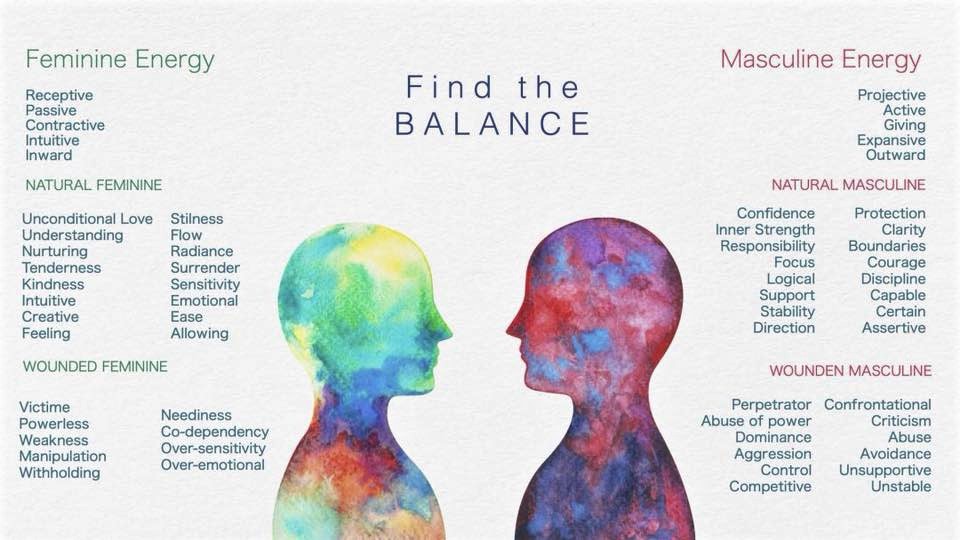Gender Energies shape the way we love. Let’s understand the Masculine and Feminine Dynamics in romance or friendship.
In relationships, many people start out feeling like best friends—bonding over shared interests, hobbies, and a sense of familiarity. That initial chemistry often gives way to deeper romantic feelings. But over time, expectations start to shift. People begin to expect their partners to think, feel, or behave like they do. When those expectations aren’t met, disappointment sets in, leading to conflict and possibly separation.
But here’s the truth: long-term relationships don’t thrive on sameness. They thrive on balance, especially when it comes to the energies each person brings to the relationship. I am not a relationship coach or guide, but I write from personal experiences, research, and curiosity.
What Are Gender Energies?
Gender energies refer to the natural masculine and feminine qualities that exist within all of us—regardless of gender identity or sexual orientation. These energies influence how we process emotions, express intimacy, and commit in relationships. Some men carry strong feminine energy; some women, a dominant masculine one. It’s less about biology and more about the energetic balance we carry.
These energies are shaped by upbringing, society, personality, and sometimes even spiritual insight. But when they clash or go unrecognised, they can lead to tension, misunderstanding, or even heartbreak in romantic relationships.
So, let’s explore how gender energies impact three crucial areas: emotions, intimacy, and commitment.
Emotions: Expression vs. Intensity
It’s often said that women are more emotional, but that’s not the full picture.
Feminine energy tends to express emotions more freely. It seeks depth, connection, and conversation. Masculine energy, on the other hand, often feels emotions deeply but struggles to express them openly. It’s not about lack of feeling—it’s about how that feeling is handled.
This can create friction. For example, when someone with strong masculine energy shuts down or retreats, their feminine partner might interpret it as disinterest or emotional coldness. In reality, they could be feeling just as deeply, just not showing it in the same way.
Then comes the ego.
Masculine energy, especially when unchecked, can come with a stronger ego. It might resist being vulnerable, avoid emotional confrontation, or clash with another strong personality. When both partners in a relationship carry strong masculine egos, it becomes a battle of control or dominance—making healthy communication nearly impossible unless both learn to soften and adapt.
Intimacy: The Dance Between Closeness and Space
Real intimacy isn’t just physical—it’s emotional closeness, trust, and presence. But this looks different depending on your core energy.
Feminine energy craves emotional closeness and often finds comfort in being consistently connected. Masculine energy, however, sometimes needs to pull away to recharge or reconnect with itself.
This difference can lead to misunderstandings. When one partner withdraws, the other may feel abandoned, unloved, or suspicious. But in many cases, the need for space is not a red flag—it’s simply the masculine energy resetting. That said, if distance becomes a pattern or feels excessive, it’s worth discussing honestly.
Knowing this helps couples avoid unnecessary drama. One seeks nearness; the other seeks stillness. When both understand and honour that rhythm, the relationship finds its natural flow.
Commitment: The Trust Timeline
In the early stages of love, people with dominant masculine energy often jump in quickly, believing they’ve found “the one.” Feminine energy moves more slowly, building trust over time. But here’s the twist: once committed, feminine energy becomes more certain, while masculine energy can begin to question.
This flip can confuse both partners.
The masculine partner, once enthusiastic, may now wrestle with doubts, not because their feelings have faded, but because the pressure of long-term commitment feels overwhelming. Feminine energy, having gained confidence in the relationship, may now crave security and consistency.
What’s the solution? Patience—but the right kind.
True patience allows the relationship to evolve organically.
Wasted time, on the other hand, comes from ignoring your emotional needs while waiting for clarity that never arrives.

Finding Balance in Gender Energies
We all carry both masculine and feminine energy within us—sometimes in harmony, sometimes in quiet conflict. Recognising which energy is more dominant in ourselves (and in others) is key to creating not only healthier romantic relationships but also more understanding human connections.
Rather than trying to change our partners—or friends—to match our emotional style or expectations, we benefit far more by respecting and responding to the energy they bring into the relationship. Masculine and feminine energies aren’t about gender roles, nor are they fixed traits. They ebb and flow, interact, and evolve, just like the people who carry them.
And while this balance is often discussed in the context of love, it matters just as much in deep friendships—those bonds that feel like soul connections. Whether in love or friendship, misaligned energy can cause friction, but understanding and awareness can bring harmony.
So the next time there’s a moment of tension, ask yourself:
Am I responding from my true energy, or reacting from fear or misunderstanding?
And am I really seeing the other person for who they are, or who I want them to be?
When we start viewing all our close relationships—romantic or platonic—through this lens, we begin to unlock a more peaceful, compassionate way of connecting. One that values difference not as a threat, but as a complement. One that sees balance as the real foundation of intimacy.
In that balance, love has the space to grow and to last.

